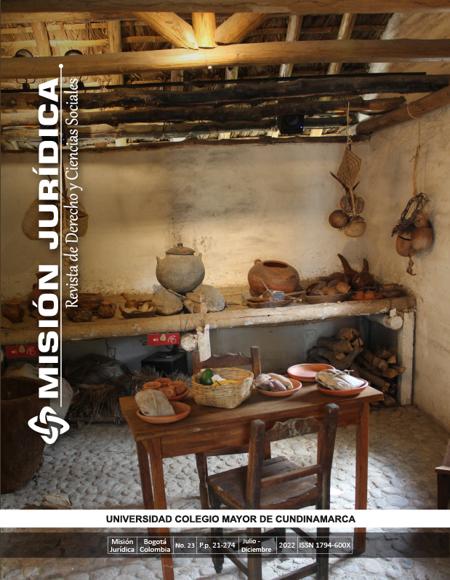Guarantees, abusive clauses and real estate consumer protection in the home purchase contract
Garantías, cláusulas abusivas y protección al consumidor inmobiliario en el contrato de compraventa de vivienda
COPYRIGHT PROVISIONS
Every papper included in the magazine can be reproduced whole or in part, provided that respect for its original content, the source is acknowledged and is used with non-commercial academic. Legal mission and its content is protected under a license Creative Commons Attribution-Noncommercial-

Misión Jurídica is distributed under a Creative Commons Attribution-NonCommercial-NoDerivar 4.0 International License.
Based on a work in http://unicolmayor.edu.co/publicaciones/index.php/mjuridica/index.
Permits that go beyond what is covered by this license can be found at http://unicolmayor.edu.co/publicaciones/index.php/mjuridica/index.
Show authors biography
The objective of this brief is to analyze the contracts of sale of housing through the rules, rights and duties contemplated in the Consumer Statute (Law 1480 of 2011), as well as in Decree 735 of 2013 on the effectiveness of the guarantee in the Colombian legal system. For this purpose, an exploratory study was carried out, which included not only a doctrinal research on laws and jurisprudence concerning the subject studied, but also an analysis of practical references, such as the current clauses offered by construction companies regarding the duties and rights of the buyer. It became evident that, at present, there are voids and abuses on the part of home sellers that do not comply to the regulatory parameters that rule them.
Article visits 295 | PDF visits 271
Downloads
- Acosta, J. (2015). Elementos de derecho europeo para la caracterización de las cláusulas abusivas en la contratación. Revista Díkaion, 24(1), 12-35.
- Ariza, A. (2009). Contratación inmobiliaria y defensa del consumidor. Perrot.
- Código Civil Colombiano. Artículo 1624.
- Constitución Política de Colombia. (1991).
- Corte Constitucional. (1993). Sentencia T-240. Abuso de la posición dominante cuando están de por medio el ejercicio de la libertad contractual.
- Corte Constitucional. (1995). Sentencia T-495. Con la cual se ratifica su posición respecto al derecho a la vivienda digna consagrado en el artículo 51 de la Constitución Política.
- Corte Constitucional (2003). Sentencia C-740. Se falla sobre el derecho de propiedad privada: Declaración de extinción de dominio sobre bienes adquiridos mediante enriquecimiento ilícito.
- Corte Constitucional de Colombia. (2011). Sentencia C-186 de 2011 (M. P. Sierra Porto Humberto Antonio: marzo 16).
- Corte Suprema de Justicia. (2002). SC de 13 dic, rad. nº 6462
- Corte Suprema de Justicia. (2001). Sala de Casación Civil y Agraria, en sentencia de 2 de febrero.
- Echeverri, V. (2011). El control a las cláusulas abusivas en los contratos de adhesión con consumidores. Revista Opinión Jurídica, 10(20), 125-144.
- Guía para el consumidor en el sector vivienda. (2016). Universidad Sergio Arboleda.Mezzasoma, L. (2014). Las cláusulas abusivas y la consolidación del remedio de la nulidad de protección en el ordenamiento jurídico italiano. Vniversitas, (128).
- Rengifo, E. (2004). Del abuso del derecho al abuso de la posición dominante. Universidad Externado de Colombia.
- Stiglitz, R., & Stiglitz, G. (1985). Contratos por adhesión, cláusulas abusivas y protección al Consumidor. De Palma.
- Universidad Sergio Arboleda. (2016).
- Valbuena, G. (2013). Reflexiones sobre el tratamiento de cláusulas abusivas en Colombia. Universidad Externado de Colombia.
- Valderrama, C. (2013). De las garantías una obligación del productor y el proveedor. Universidad Externado de Colombia.















